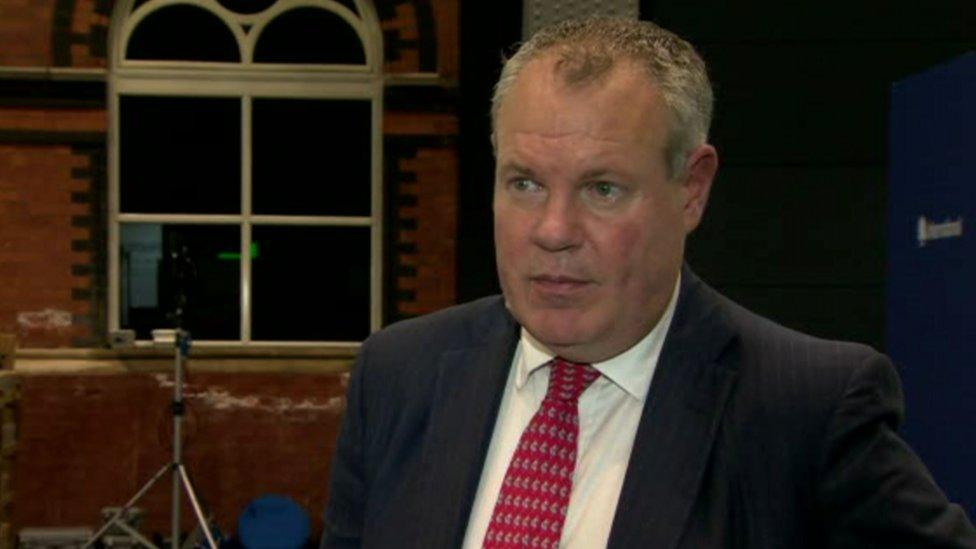Troubles amnesty plan: Government would listen to new proposals
- Published

Belfast-born MP Conor Burns said the government would be "all ears" if Stormont parties could agree an alternative plan
The Westminster government is prepared to listen to alternative proposals on dealing with Troubles legacy cases, Minister of State Conor Burns has said.
But he suggested Stormont's political parties should find a consensus first.
Stormont parties and victims' groups oppose the government's plan to ban all future Troubles-related prosecutions.
A survey for the main organisation representing Troubles victims suggests that 70% of Northern Ireland people are against the government's amnesty plan.
The Commission for Victims and Survivors (CVS) is due to deliver the survey's findings to a Stormont committee later.
Speaking ahead of the committee hearing, Mr Burns said: "We are listening to all the responses, I've been reading some of the initial comments that have been made."
The minister of state acknowledged the widespread opposition to the proposed ban on prosecutions, noting that all five main parties in Northern Ireland "have not exactly greeted these proposals warmly".
But he added: "If they get to together, and if they can find a consensus amongst the five of them for an alternative approach that they can all sign up to, we are all ears."
'Dragging their feet'
Reacting, Sinn Féin assembly member Gerry Kelly said: "Conor Burns stating that if the parties can agree a way forward then the British government is 'all ears' simply emphasises his lack of knowledge and his sheer disregard for victims.
"The two governments and the political parties agreed the legacy structures in the Stormont House Agreement and the British government have been dragging their feet and stalling ever since."
The Stormont House Agreement, signed in 2014, committed to a number of initiatives around legacy cases, including an Historical Investigations Unit to examine unsolved murders carried out during the Troubles.
During Wednesday's committee meeting, Assembly members will also hear criticism of the fact that the CVS has been without a new commissioner for more than a year.
The vacancy was only recently advertised and may take up to six months to fill.

Thousands of people were killed or seriously injured in Troubles-era attacks and many families are still seeking justice
The last commissioner, Judith Thompson, left office in August 2020, when the first and deputy first ministers decided against extending her tenure.
"This situation is incomparable to any other commission-led body," said Mary Moreland, a member of the commission's victims and survivors forum.
"It effectively silences the voices of those who have been affected by the Troubles and has stripped them of an independent champion at such a critical time."
'Do not reflect majority of voices'
The government is currently deciding whether to press on with its legacy plan.
CVS commissioned LucidTalk NI to conduct a poll around dealing with the past.
It surveyed 2,099 adults during August - a quarter of whom identified themselves as Troubles victims - and the margin of error was plus or minus 2.3%.
It found 70% of them did not support the idea of a statute of limitations, which would end prosecutions for Troubles-related offences committed before 1998.
Of those polled, 20% were in favour, with the remainder largely undecided.
"Those who advocate for 'drawing a line' under people's grief or pain, do not reflect our voice, or indeed the voices of the majority of the population," said Ms Moreland.
The commission was established as a non-departmental public body under legislation in 2008.
One of the roles of its commissioner is to advise the government and the Northern Ireland Executive on issues concerning victims and survivors of the Troubles.
Related topics
- Published23 September 2021

- Published16 September 2021

- Published20 July 2021
